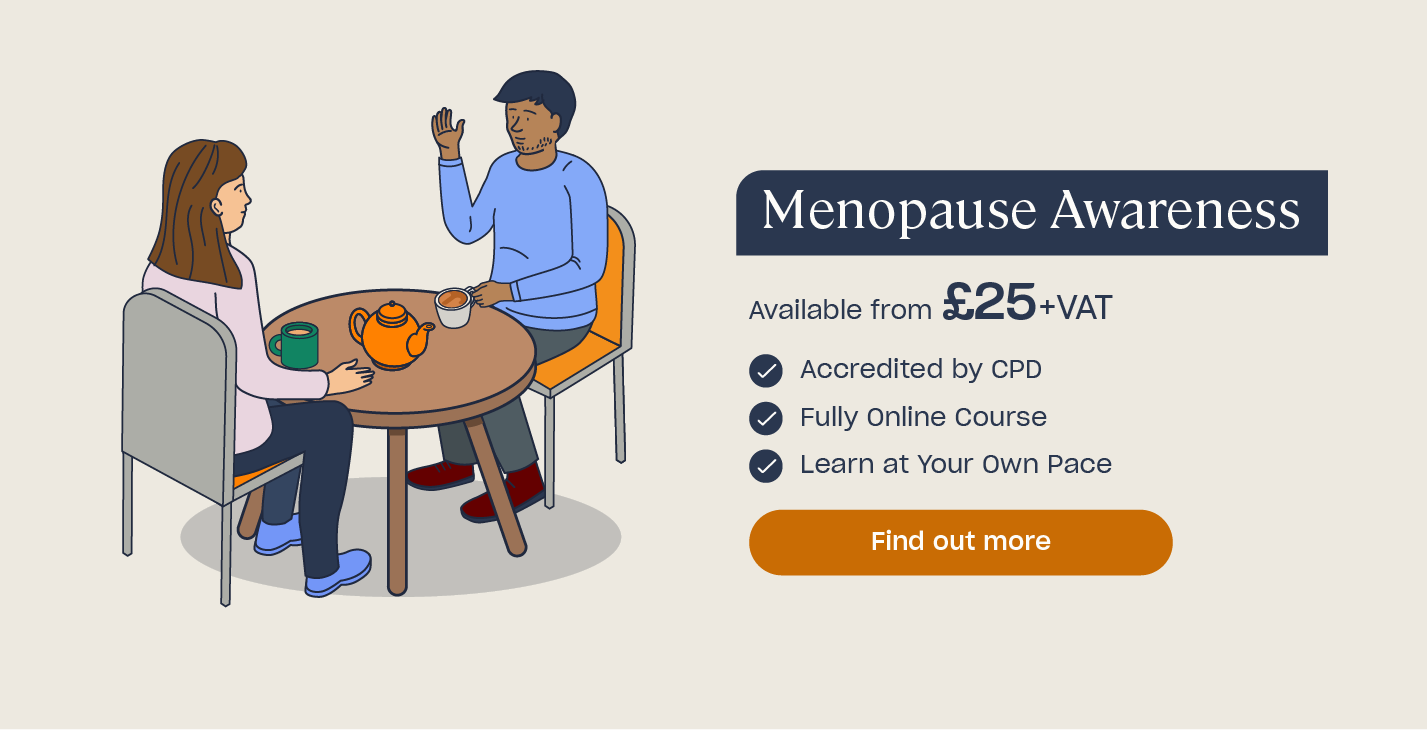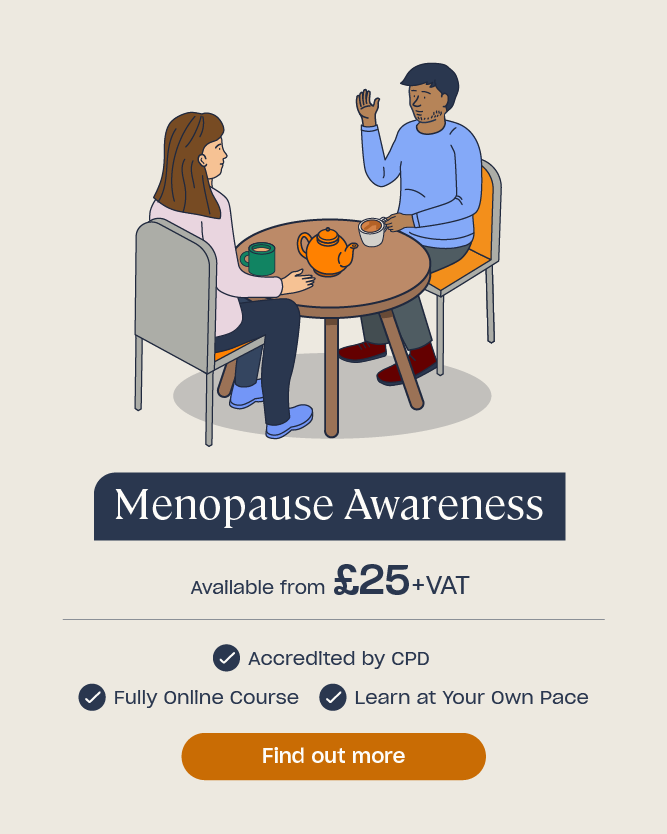Menopause Myths and Facts
Menopause marks the end of a person’s reproductive cycle. It includes perimenopause, menopause and postmenopause and usually affects people aged around 45-55. Menopausal women are the fastest growing demographic in the workplace. In the UK, it is estimated that 13 million women are either perimenopausal or menopausal. This is equivalent to a third of the entire UK female population.
With so many people being affected, lots of facts are shared about menopause. However, this also brings about the sharing of myths. In this article, we will outline some of the most common myths about menopause, along with the correct facts in order to increase your understanding of what it is and how it affects people.
In this article, we will refer to those experiencing menopause as women. However, we are aware that menopause directly affects everyone who has a menstrual cycle, including non-binary, intersex and trans people. We use the term women in line with a number of organisations that research and cover this topic. We seek not to generalise or diminish anybody’s personal experience and recognise that everybody’s symptoms and experiences of menopause are different.
What is Menopause?
Menopause is when a woman stops having menstrual periods, marking the end of fertility. This usually happens around the age of 45-55 when the ovaries no longer release an egg every month.
Menopause starts when a woman has not had a period for 12 months and involves numerous stages, including:
Perimenopause – This is when the ovaries gradually slow down and can involve changes in the normal pattern of periods or irregular periods. This stage also involves a range of symptoms and can last for months or years before a woman’s periods stop.
Menopause – This starts when a woman has not had a period for 12 months and can involve a range of symptoms. On average, menopause symptoms last for 4-8 years. The term menopause is usually used to refer to the whole period of time, including perimenopause and postmenopause. However it is actually only one day, the day when a woman has not had a period for 12 months, this is menopause.
Postmenopause – This begins the day after a woman has reached menopause, so when they have not had a period for 12 months and one day. During this stage many women will continue to have symptoms and this can continue for years after menopause.
Looking to Learn More?
Our Menopause Awareness Training Course will help you develop your understanding of menopause and the impact it can have. It provides a comprehensive overview of menopause, including the symptoms and treatment options available to help you support yourself, and those affected by menopause.

Myths and Facts About Menopause
Myth 1: You Only Experience Menopause After the Age of 50
In the UK, perimenopause and menopause usually occurs between the ages of 45 and 55. However, it can start before the age of 45 which is called early menopause, menopause before the age of 40 is called premature menopause. Furthermore, it may not start until the age of over 55, this is called late-onset menopause.
Myth 2: Menopause Symptoms are the Same for Everyone
Everyone’s experience of menopause will be different. No two women will experience the same symptoms and the age of onset, as well as which treatments are effective will also differ.

Common symptoms of menopause include:
- Hot flushes/flashes.
- Night sweats.
- Insomnia or sleep disturbance.
- Fatigue.
- Poor concentration.
- Memory problems.
- Brain fog.
- Changes in mood, such as low mood, loss of confidence and irritability.
- Psychological symptoms, such as depression, anxiety and panic attacks.
- Heart palpitations.
- Vaginal dryness, itching and discomfort.
- Changes to sex drive.
- Headaches and migraines.
- Joint aches, pains and stiffness.
- Changes in skin condition, such as increased dryness.
- Urinary problems.
- Dry eyes.
- Hair loss or thinning.
- Loose teeth and losing teeth, this occurs due to declining oestrogen levels contributing to the loss of bone mass.
- Weight gain due to reduced muscle mass, meaning you need fewer calories.
- Increased feelings of hunger.
Myth 3: Menopause is Not a Workplace Issue
Employers have a duty to ensure everyone’s health, safety and welfare at work, as well as make reasonable adjustments where needed. Therefore, employers should inform and educate all members of staff about menopause, including providing additional training and the right support for employees affected by menopause.
Making the workplace a menopause friendly environment has a wealth of benefits. Increased morale, increased productivity and lower staff absence rates are a few of the reasons why workplaces should train all employees and make reasonable adjustments with regard to menopause. Learn more about its importance in our article: How to Provide Menopause Support in the Workplace.
Myth 4: You Should Only Seek Medical Help When Your Symptoms are Really Bad
Women’s experiences of menopause can vary greatly, including which symptoms they experience and the severity of them. You should always speak to your GP or a doctor if your symptoms are troubling you as they can offer support, guidance and treatments to help.

The main treatment to help with menopause is hormone replacement therapy (HRT) which uses oestrogen to replace your body’s own levels. HRT comes in many forms including skin patches, gels or sprays for the skin, implants and tablets. There are other treatments, such as Cognitive Behavioural Therapy (CBT) and maintaining a healthy diet with regular exercise that can also help with menopause symptoms.
Myth 5: Taking HRT Causes Breast Cancer and Increases the Chances of Stroke and Heart Attacks
Like any other medication, taking HRT can cause some side effects including headaches, nausea and vaginal bleeding. However, it is not true that taking HRT can increase your risk of stroke and heart attacks and it does not cause breast cancer. It can actually reduce the risk of heart attacks and stroke when taken before the age of 60.
Another common myth surrounding the use of HRT is that it is believed to delay menopause for longer. This is not true, HRT only treats the symptoms of menopause and cannot affect its onset.
We hope you found this article informative and that you have gained a better understanding of menopause, including the correct facts behind some of the common menopause myths. There are a multitude of myths surrounding menopause and it is important that people are educated and aware of the myths and the facts.
If you’d like to learn more about menopause and how training can help you in your workplace, call us on 0333 006 7000 or contact support@highspeedtraining.co.uk, and we’ll do our best to answer any questions you may have.
Further Resources:
- Menopause Awareness Course
- How to Promote Inclusive Communication in the Workplace
- Stress Management Activities to Try at Home







